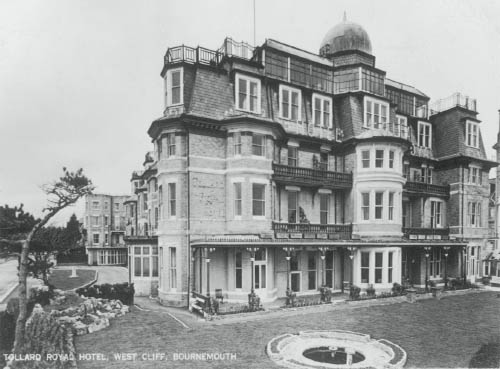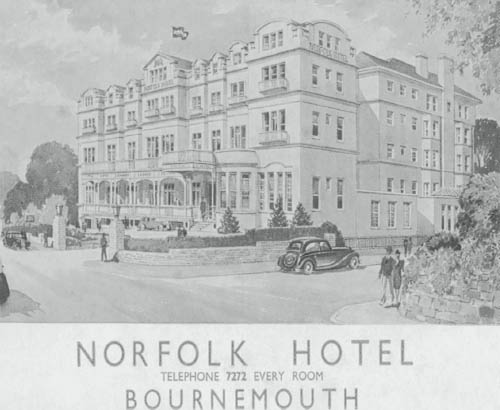Dorset Murders (30 page)


G
roup Captain Rupert Brooke looked the very picture of respectability. Tall and broad-shouldered, he carried himself with a military bearing befitting his rank. An intelligent and well-spoken man, his fair, wavy hair and piercing blue eyes, coupled with a charming manner, ensured that he was never short of female admirers.
On 3 July 1946, he met the latest of his conquests while out for a stroll on the promenade in Bournemouth. Doreen Marshall of Pinner, Middlesex, had recently been discharged from the WRNS. Shortly afterwards, she fell ill with a bout of influenza and, deciding that some sea air would do her good, had travelled to Bournemouth to convalesce.
She was only too pleased to meet a handsome stranger and, after chatting with Brooke for some time, accepted his invitation to take tea with him at the hotel where he was staying, the Tollard Royal in West Hill Road.
She enjoyed a pleasant afternoon with her new-found friend, so much so that she agreed to return to his hotel and dine with him that evening. At first, the dinner date was enjoyable, but by the time the meal had finished, Brooke was beginning to show the effects of the alcohol he had drunk that evening and Miss Marshall was finding his company a little wearing. Looking strained, she asked another hotel resident to order her a taxi to take her back to the Norfolk Hotel on Richmond Hill. However, Brooke cancelled the taxi, promising that he would walk her back. As the couple left the Tollard Royal, he remarked to the night porter that he would be back in half an hour. âNo, in a quarter of an hour', argued Miss Marshall and the two walked off together in the direction of Richmond Hill.

Tollard Royal Hotel, Bournemouth, 1953
.

The Norfolk Hotel, Bournemouth, 1950s
.
By 4.30 a.m., the night porter had not seen Group Captain Brooke return. He went up to Brooke's room and quietly opened the door to see Brooke fast asleep in his bed, having apparently entered the hotel by shinning up a ladder and climbing through his bedroom window. His shoes, which would normally have been left out for cleaning, were by his bed, caked in wet sand.
The following morning, Brooke was challenged by the head porter about his unorthodox return to the hotel and insisted that he had been playing a joke on the night porter. Other residents at the hotel noticed that Brooke had some fresh scratch marks on his neck, which he had partially concealed with a scarf. He was also spending freely at the hotel bar and, unusually, paying for his drinks with cash rather than adding them to his bill.
On 5 July, the manager of the Norfolk Hotel felt sufficiently concerned about the absence of one of his guests, Miss Marshall, to telephone the police in Bournemouth and report her missing. Having done some investigating of his own, the manager subsequently rang the Tollard Royal Hotel and spoke to Brooke, asking him if his dinner guest on 3 July had been a Miss Marshall from Pinner. Brooke laughed off the idea, saying that he had known his lady friend for years and she did not come from Pinner. Nevertheless, the hotel manager concluded the conversation by advising Brooke to contact the police and later that same day Brooke did exactly that.
He telephoned the police station at Bournemouth and asked if there was a photograph of the missing woman. When told that there was, he declined the police's offer to bring the photograph to his hotel for him to look at, promising to call in at the police station instead.
When he arrived at the police station, he immediately aroused suspicion because he seemed to be dressed too casually for a high-ranking RAF officer, wearing his shirt buttoned to the neck, with no tie or cravat. As he chatted with Detective Constable George Suter about his air force service, the policeman noticed several inconsistencies in his descriptions of aircraft types. Brooke dropped his pipe at one point in the conversation and, as he bent down to retrieve it, the observant police officer spotted what looked like a fingernail mark on his neck. In addition, Suter couldn't help but notice that Brooke bore a remarkable resemblance to a wanted poster recently issued by Scotland Yard, currently pinned on the wall of the police station's CID office.
Suter excused himself for another look at the poster, bringing it back into the interview with him when he returned and confronting Brooke with the question, âIs that you?'
Brooke glanced at the poster briefly. âGood Lord, no!' he replied quickly, before conceding. âBut I agree it is like me.'
Brooke later met Doreen Marshall's father and sister at the police station and joked about his likeness to the wanted poster. Yet the officers at Bournemouth were not treating the resemblance quite so lightly and detained Brooke pending further enquiries.
As Brooke waited at the police station, he complained of feeling cold and asked if police could fetch his jacket from the hotel. Officers agreed, taking the opportunity to search the pockets of the jacket as they did. They recovered an artificial pearl bead, a first-class return Bournemouth-London train ticket and a ticket from the left luggage office of the Bournemouth West Station, issued on 23 June.
When they redeemed the ticket, they were given a suitcase, which contained a bloodstained scarf and a leather-covered riding whip, with a plaited leather thong. A search of Brooke's room at the Tollard Royal later turned up a tightly knotted, bloody handkerchief, with a few hairs entangled in the knot.
At 9.45 p.m. that evening, officers informed Brooke that they were now satisfied that he was the Mr Neville George Clevely Heath wanted by Scotland Yard in connection with the murder of Margery Gardner on 20â21 June, and that he would be detained in Bournemouth pending the arrival of their colleagues from London. âBrooke's' only comment was, âOh, all right.'
Later that evening, he volunteered to write a statement, giving his account of his meeting with twenty-one-year-old Doreen Marshall and another woman who he knew as Peggy. Having described eating dinner with Doreen, he told of walking her back to her hotel. According to Heath â for he had now acknowledged his true identity â the couple had chatted for at least an hour and Miss Marshall had been insistent that he needn't trouble himself to escort her all the way back to her hotel. Hence, he had left her at the entrance to Bournemouth pier, watching her cross the road and enter the gardens, before returning to his own hotel.
Some hours later, Heath offered to make a further statement, this time on the murder of Margery Gardner.
Heath and Gardner had met at the Panama Club in South Kensington, London. After an evening of drinking and dancing, thirty-two-year-old Gardner, who was known to favour masochistic sexual practices, had agreed to accompany Heath back to his room at the Pembridge Court Hotel in Notting Hill.
She was found dead in the hotel room the following morning. She had been tied up and savagely beaten, before being suffocated. Her body bore the marks of seventeen whip lashes, both her nipples had been almost completely bitten off and she had severe internal damage caused by the forceful insertion of a large object into her vagina. Of âLieutenant Colonel' Heath, there was no trace.
However, the following weekend, Superintendent Barratt, the officer in charge of the inquiry into Gardner's murder, received a letter from Heath. In it, he claimed to have had drinks with Margery Gardner, during which time she had told him that she was obliged to sleep with someone, Heath had assumed for financial reasons. He had offered Margery the use of his hotel room for her assignation, given her his keys and told her that he would return at 2 a.m. When he returned at 3 a.m., it was to find Miss Gardner â. . . in the condition of which you are aware'.
Realising that he would immediately be under suspicion for her murder, he had quickly packed his belongings and left. The letter continued with a description of âJack', Miss Gardner's friend who, according to Heath, was aged about thirty, with black hair and a small moustache, 5ft 9in tall and of medium build. It concluded with Heath writing that he had the instrument with which Miss Gardner was beaten in his possession and promising to forward it to the police. They would find his fingerprints on it, he wrote, but they would also find other prints too.
The âinstrument' never arrived and, in his new statement to Bournemouth police, Heath admitted that it was the riding whip that they had found in his suitcase. He insisted that he had not murdered Margery Gardner, although he had been present when she was killed.

Branksome Dene Chine, Bournemouth, 1930s
.
Meanwhile, the police mounted an intensive search for any trace of Doreen Marshall, in the course of which they found several discarded items of clothing and pieces of jewellery. Doreen's father and sister were shown every find, but were unable to positively identify any of the items as having belonged to Doreen.
On 7 July, Kathleen Evans was walking her dog at Branksome Dene Chine when she noticed huge numbers of flies swarming round rhododendron bushes. The following day, she read a report about Doreen Marshall's disappearance in the local newspaper and asked her parents to go back with her to the spot where she had seen the clouds of insects. The search for Doreen Marshall was over.
The young woman was huddled in bushes, naked except for one shoe. Her clothes had been piled on top of her body and her stockings, powder compact and twenty-seven pearls from her broken necklace lay nearby.
The cause of her death was a deep cut across her throat but, in addition, her body had also been severely mutilated. She was covered in bruises and small cuts, and both hands were cut as if she had seized the blade of a knife while trying to fend off her attacker. She had several broken ribs, including one that had splintered and been driven into one of her lungs. Both her nipples had been bitten, the right one having been completely severed and the left severely torn. A sharp object had been thrust into her vagina and she had long, deep knife wounds across her thighs and breasts.
The following morning, Doreen's handbag was found behind beach huts at Durley Chine. A diamond ring and a fob watch were also recovered, having been sold to a shop in Bournemouth soon after she had disappeared.